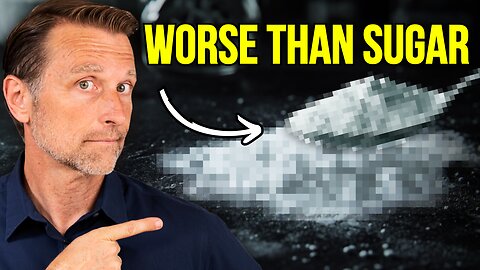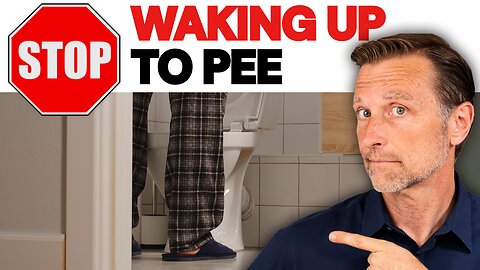-
The #1 Vitamin Depleting Food in the World
 Dr. Eric BergFind out why refined starches are the #1 vitamin-depleting food in the world. In this video, I’ll explain the critical role of vitamin B1 in the metabolism of refined starches. Learn to spot the signs of a vitamin B1 deficiency before they wreak havoc on your life! 0:00 Introduction: Refined starches 0:47 Refined starches and vitamin deficiency 2:02 Vitamin B1 deficiency symptoms 4:33 What causes B1 deficiency? 5:02 Best food sources of vitamin B1 5:40 Magnesium deficiency and refined starches More videos on vitamin B1: ▶️ https://youtu.be/vppzm2NsIYo ▶️ https://youtu.be/rjVXFqiPDwE ▶️ https://youtu.be/xxdaLKfFD80 ▶️ https://youtu.be/83sOzga-i0I Refined starches include rice flour, tapioca flour, corn flour, modified corn starch, maltodextrin, and modified food starch. Certain nutrients are required to metabolize refined starch and turn it into energy. Vitamin B1 (thiamine) is vital to this process. Refined starches are much higher on the glycemic index (GI) than sugar—this scale tells you how fast a food can raise blood sugar. Sugar is a 74 on the GI, while refined starches like maltodextrin are 180! Vitamin B1 is not stored in the body in large amounts, so consuming refined starches can quickly cause you to become deficient. Symptoms of vitamin B1 deficiency include: •Fatigue •GI problems (slow digestion, bloating, constipation, nausea) •Low stomach acid •Low bile •Stress •Nervous tension •Insomnia •Frequent mood swings •Muscle twitches •Breathing problems Much of the refined starch broken down into glucose in the body can not be used as energy, so it’s converted into lactic acid. This decreases oxygen in the body and makes it more acidic, which can cause hyperventilation and restless legs syndrome. Along with diet, the following factors can also contribute to vitamin B1 deficiency: •Alcohol •Tea •Coffee •Raw fish •Gut issues •Metformin •Excessive exercise Meat, especially pork, is the best food source of vitamin B1. Liver, eggs, and sunflower seeds are also good sources. Refined grains are often fortified with synthetic B vitamins, which you should avoid. If you want to supplement vitamin B1, look for the natural form called allithiamine. Benfotiamine is also a good supplement form of vitamin B1. Magnesium is an important cofactor involved in turning starches into energy. If you don’t have enough magnesium, vitamin B1 won’t work. Magnesium helps control calcium in the body. Symptoms of low magnesium include: •Muscle spasms •Calcium buildup •Kidney stones •High blood pressure •Palpitations •High cortisol •Trouble sleeping •Tremors •Muscle weakness •Migraines Magnesium glycinate is the most absorbable form of magnesium! Dr. Eric Berg DC Bio: Dr. Berg, age 59, is a chiropractor who specializes in Healthy Ketosis & Intermittent Fasting. He is the author of the best-selling book The Healthy Keto Plan, and is the Director of Dr. Berg Nutritionals. He no longer practices, but focuses on health education through social media. Follow Me On Social Media: YouTube: https://www.youtube.com/@Drberg/ YouTube Shorts: https://www.youtube.com/@UCpWhiwlOPxOmwQu5xyjtLDw Facebook: https://www.facebook.com/drericberg Instagram: https://www.instagram.com/drericberg/ Spotify Podcast: 🎧 https://drbrg.co/DrBerg-Spotify TikTok: https://www.tiktok.com/@drbergofficial Disclaimer: Dr. Eric Berg received his Doctor of Chiropractic degree from Palmer College of Chiropractic in 1988. His use of “doctor” or “Dr.” in relation to himself solely refers to that degree. Dr. Berg is a licensed chiropractor in Virginia, California, and Louisiana, but he no longer practices chiropractic in any state and does not see patients, so he can focus on educating people as a full-time activity, yet he maintains an active license. This video is for general informational purposes only. It should not be used to self-diagnose, and it is not a substitute for a medical exam, cure, treatment, diagnosis, prescription, or recommendation. It does not create a doctor-patient relationship between Dr. Berg and you. You should not make any change in your health regimen or diet before first consulting a physician and obtaining a medical exam, diagnosis, and recommendation. Always seek the advice of a physician or other qualified health provider with any questions you may have regarding a medical condition. #health #keto #ketodiet #weightloss #ketolifestyle #intermittentfasting #lowcarb Thanks for watching! I hope this increases your awareness about the problem with refined starches. I’ll see you in the next video.12.6K views 9 comments
Dr. Eric BergFind out why refined starches are the #1 vitamin-depleting food in the world. In this video, I’ll explain the critical role of vitamin B1 in the metabolism of refined starches. Learn to spot the signs of a vitamin B1 deficiency before they wreak havoc on your life! 0:00 Introduction: Refined starches 0:47 Refined starches and vitamin deficiency 2:02 Vitamin B1 deficiency symptoms 4:33 What causes B1 deficiency? 5:02 Best food sources of vitamin B1 5:40 Magnesium deficiency and refined starches More videos on vitamin B1: ▶️ https://youtu.be/vppzm2NsIYo ▶️ https://youtu.be/rjVXFqiPDwE ▶️ https://youtu.be/xxdaLKfFD80 ▶️ https://youtu.be/83sOzga-i0I Refined starches include rice flour, tapioca flour, corn flour, modified corn starch, maltodextrin, and modified food starch. Certain nutrients are required to metabolize refined starch and turn it into energy. Vitamin B1 (thiamine) is vital to this process. Refined starches are much higher on the glycemic index (GI) than sugar—this scale tells you how fast a food can raise blood sugar. Sugar is a 74 on the GI, while refined starches like maltodextrin are 180! Vitamin B1 is not stored in the body in large amounts, so consuming refined starches can quickly cause you to become deficient. Symptoms of vitamin B1 deficiency include: •Fatigue •GI problems (slow digestion, bloating, constipation, nausea) •Low stomach acid •Low bile •Stress •Nervous tension •Insomnia •Frequent mood swings •Muscle twitches •Breathing problems Much of the refined starch broken down into glucose in the body can not be used as energy, so it’s converted into lactic acid. This decreases oxygen in the body and makes it more acidic, which can cause hyperventilation and restless legs syndrome. Along with diet, the following factors can also contribute to vitamin B1 deficiency: •Alcohol •Tea •Coffee •Raw fish •Gut issues •Metformin •Excessive exercise Meat, especially pork, is the best food source of vitamin B1. Liver, eggs, and sunflower seeds are also good sources. Refined grains are often fortified with synthetic B vitamins, which you should avoid. If you want to supplement vitamin B1, look for the natural form called allithiamine. Benfotiamine is also a good supplement form of vitamin B1. Magnesium is an important cofactor involved in turning starches into energy. If you don’t have enough magnesium, vitamin B1 won’t work. Magnesium helps control calcium in the body. Symptoms of low magnesium include: •Muscle spasms •Calcium buildup •Kidney stones •High blood pressure •Palpitations •High cortisol •Trouble sleeping •Tremors •Muscle weakness •Migraines Magnesium glycinate is the most absorbable form of magnesium! Dr. Eric Berg DC Bio: Dr. Berg, age 59, is a chiropractor who specializes in Healthy Ketosis & Intermittent Fasting. He is the author of the best-selling book The Healthy Keto Plan, and is the Director of Dr. Berg Nutritionals. He no longer practices, but focuses on health education through social media. Follow Me On Social Media: YouTube: https://www.youtube.com/@Drberg/ YouTube Shorts: https://www.youtube.com/@UCpWhiwlOPxOmwQu5xyjtLDw Facebook: https://www.facebook.com/drericberg Instagram: https://www.instagram.com/drericberg/ Spotify Podcast: 🎧 https://drbrg.co/DrBerg-Spotify TikTok: https://www.tiktok.com/@drbergofficial Disclaimer: Dr. Eric Berg received his Doctor of Chiropractic degree from Palmer College of Chiropractic in 1988. His use of “doctor” or “Dr.” in relation to himself solely refers to that degree. Dr. Berg is a licensed chiropractor in Virginia, California, and Louisiana, but he no longer practices chiropractic in any state and does not see patients, so he can focus on educating people as a full-time activity, yet he maintains an active license. This video is for general informational purposes only. It should not be used to self-diagnose, and it is not a substitute for a medical exam, cure, treatment, diagnosis, prescription, or recommendation. It does not create a doctor-patient relationship between Dr. Berg and you. You should not make any change in your health regimen or diet before first consulting a physician and obtaining a medical exam, diagnosis, and recommendation. Always seek the advice of a physician or other qualified health provider with any questions you may have regarding a medical condition. #health #keto #ketodiet #weightloss #ketolifestyle #intermittentfasting #lowcarb Thanks for watching! I hope this increases your awareness about the problem with refined starches. I’ll see you in the next video.12.6K views 9 comments -
STOP Nighttime Peeing Now: IT REALLY WORKS
 Dr. Eric BergDiscover the underlying cause of nocturia to stop frequent urination at night for good. Once you understand the root cause, you can quickly decrease urination frequency at night and sleep better immediately. 0:00 Introduction: How to fix urination frequency at night 0:33 Enlarged prostate and frequent urination 0:54 What causes nocturia? 1:40 Insulin resistance and an overactive bladder 3:16 What increases urination frequency at night? 5:02 Low-salt diets and frequent urination 5:42 Keto and intermittent fasting to reduce urination frequency Overview of the Healthy Ketogenic Diet: https://drbrg.co/3CNCkeP https://drbrg.co/3QlnPlm Healthy Ketogenic Diet and Intermittent Fasting Videos: ▶️ https://youtu.be/vMZfyEy_jpI ▶️ https://youtu.be/mBqpaAKtnXE More videos about Frequent Urination at Night ▶️ https://youtu.be/Ku56lZTV7OY ▶️ https://youtu.be/Iwza7s0RbzM Vitamin D: How much to take ▶️ https://youtu.be/NFxQJmvgXOQ Attempting to address urination frequency by treating an enlarged prostate is not the best solution! Frequent urination is often blamed on an enlarged prostate, UTIs, or kidney stones, but there’s a much more common root cause. The most common cause of frequent urination at night is too much insulin in your blood. Insulin resistance is a condition where your insulin receptors no longer accept insulin. To compensate, the pancreas produces more insulin. This is why many diabetics have a problem with urinary frequency at night. When blood sugar is high, the kidneys remove the sugar from the blood to eliminate it from the body. This increases urination frequency. Insulin resistance causes an overactive bladder, even if your blood sugar is normal. Increased urinary frequency at night is an early sign of insulin resistance, which is a precursor to diabetes. Insulin resistance increases stress on the kidneys, which is why diabetes is the leading cause of kidney disease. Insulin resistance can also cause electrolyte imbalances, blood pressure changes at night, and increased cortisol. Snacking at night is the single most significant cause of frequent urination at night. Eliminate all snacks and beverages after dinner to decrease urination frequency at night. Snacking at night can also cause bloating and interrupted sleep. A low-salt diet can also increase urination frequency at night. If you think your nocturia is due to low salt, add more sea salt to your meals throughout the day. A low-carb diet can help reduce nocturia symptoms. Keep your carb consumption under 30 grams per day. Healthy Keto® can combat insulin resistance, improve your health, and reduce frequent urination at night. Intermittent fasting is equally important in reversing insulin resistance. Aim for 3 meals with no snacks, eventually dropping down to 2 meals each day. Ending nocturia will significantly enhance your sleep, which is vital for your heart, blood sugar, stress levels, energy, cognitive function, and more. Don’t forget to get plenty of vitamin D with magnesium. Dr. Eric Berg DC Bio: Dr. Berg, age 59, is a chiropractor who specializes in Healthy Ketosis & Intermittent Fasting. He is the author of the best-selling book The Healthy Keto Plan, and is the Director of Dr. Berg Nutritionals. He no longer practices, but focuses on health education through social media. Follow Me On Social Media: YouTube: https://www.youtube.com/@Drberg/ YouTube Shorts: https://www.youtube.com/@UCpWhiwlOPxOmwQu5xyjtLDw Facebook: https://www.facebook.com/drericberg Instagram: https://www.instagram.com/drericberg/ Spotify Podcast: 🎧 https://drbrg.co/DrBerg-Spotify TikTok: https://www.tiktok.com/@drbergofficial X: https://x.com/dr_ericberg Disclaimer: Dr. Eric Berg received his Doctor of Chiropractic degree from Palmer College of Chiropractic in 1988. His use of “doctor” or “Dr.” in relation to himself solely refers to that degree. Dr. Berg is a licensed chiropractor in Virginia, California, and Louisiana, but he no longer practices chiropractic in any state and does not see patients, so he can focus on educating people as a full-time activity, yet he maintains an active license. This video is for general informational purposes only. It should not be used to self-diagnose, and it is not a substitute for a medical exam, cure, treatment, diagnosis, prescription, or recommendation. It does not create a doctor-patient relationship between Dr. Berg and you. You should not make any change in your health regimen or diet before first consulting a physician and obtaining a medical exam, diagnosis, and recommendation. Always seek the advice of a physician or other qualified health provider with any questions you may have regarding a medical condition. #health #keto #ketodiet #weightloss #ketolifestyle #intermittentfasting #lowcarb Thanks for watching! I hope this helps relieve your nocturia symptoms. I’ll see you in the next video.11.3K views 23 comments
Dr. Eric BergDiscover the underlying cause of nocturia to stop frequent urination at night for good. Once you understand the root cause, you can quickly decrease urination frequency at night and sleep better immediately. 0:00 Introduction: How to fix urination frequency at night 0:33 Enlarged prostate and frequent urination 0:54 What causes nocturia? 1:40 Insulin resistance and an overactive bladder 3:16 What increases urination frequency at night? 5:02 Low-salt diets and frequent urination 5:42 Keto and intermittent fasting to reduce urination frequency Overview of the Healthy Ketogenic Diet: https://drbrg.co/3CNCkeP https://drbrg.co/3QlnPlm Healthy Ketogenic Diet and Intermittent Fasting Videos: ▶️ https://youtu.be/vMZfyEy_jpI ▶️ https://youtu.be/mBqpaAKtnXE More videos about Frequent Urination at Night ▶️ https://youtu.be/Ku56lZTV7OY ▶️ https://youtu.be/Iwza7s0RbzM Vitamin D: How much to take ▶️ https://youtu.be/NFxQJmvgXOQ Attempting to address urination frequency by treating an enlarged prostate is not the best solution! Frequent urination is often blamed on an enlarged prostate, UTIs, or kidney stones, but there’s a much more common root cause. The most common cause of frequent urination at night is too much insulin in your blood. Insulin resistance is a condition where your insulin receptors no longer accept insulin. To compensate, the pancreas produces more insulin. This is why many diabetics have a problem with urinary frequency at night. When blood sugar is high, the kidneys remove the sugar from the blood to eliminate it from the body. This increases urination frequency. Insulin resistance causes an overactive bladder, even if your blood sugar is normal. Increased urinary frequency at night is an early sign of insulin resistance, which is a precursor to diabetes. Insulin resistance increases stress on the kidneys, which is why diabetes is the leading cause of kidney disease. Insulin resistance can also cause electrolyte imbalances, blood pressure changes at night, and increased cortisol. Snacking at night is the single most significant cause of frequent urination at night. Eliminate all snacks and beverages after dinner to decrease urination frequency at night. Snacking at night can also cause bloating and interrupted sleep. A low-salt diet can also increase urination frequency at night. If you think your nocturia is due to low salt, add more sea salt to your meals throughout the day. A low-carb diet can help reduce nocturia symptoms. Keep your carb consumption under 30 grams per day. Healthy Keto® can combat insulin resistance, improve your health, and reduce frequent urination at night. Intermittent fasting is equally important in reversing insulin resistance. Aim for 3 meals with no snacks, eventually dropping down to 2 meals each day. Ending nocturia will significantly enhance your sleep, which is vital for your heart, blood sugar, stress levels, energy, cognitive function, and more. Don’t forget to get plenty of vitamin D with magnesium. Dr. Eric Berg DC Bio: Dr. Berg, age 59, is a chiropractor who specializes in Healthy Ketosis & Intermittent Fasting. He is the author of the best-selling book The Healthy Keto Plan, and is the Director of Dr. Berg Nutritionals. He no longer practices, but focuses on health education through social media. Follow Me On Social Media: YouTube: https://www.youtube.com/@Drberg/ YouTube Shorts: https://www.youtube.com/@UCpWhiwlOPxOmwQu5xyjtLDw Facebook: https://www.facebook.com/drericberg Instagram: https://www.instagram.com/drericberg/ Spotify Podcast: 🎧 https://drbrg.co/DrBerg-Spotify TikTok: https://www.tiktok.com/@drbergofficial X: https://x.com/dr_ericberg Disclaimer: Dr. Eric Berg received his Doctor of Chiropractic degree from Palmer College of Chiropractic in 1988. His use of “doctor” or “Dr.” in relation to himself solely refers to that degree. Dr. Berg is a licensed chiropractor in Virginia, California, and Louisiana, but he no longer practices chiropractic in any state and does not see patients, so he can focus on educating people as a full-time activity, yet he maintains an active license. This video is for general informational purposes only. It should not be used to self-diagnose, and it is not a substitute for a medical exam, cure, treatment, diagnosis, prescription, or recommendation. It does not create a doctor-patient relationship between Dr. Berg and you. You should not make any change in your health regimen or diet before first consulting a physician and obtaining a medical exam, diagnosis, and recommendation. Always seek the advice of a physician or other qualified health provider with any questions you may have regarding a medical condition. #health #keto #ketodiet #weightloss #ketolifestyle #intermittentfasting #lowcarb Thanks for watching! I hope this helps relieve your nocturia symptoms. I’ll see you in the next video.11.3K views 23 comments

